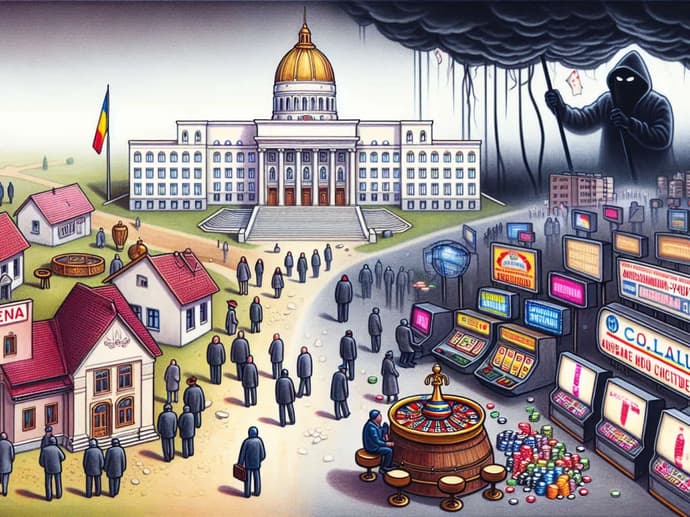
Challenges in Implementing Gambling Bans: Romania’s Struggle to Enforce New “law of slot machines”

Romania’s recent move to ban gambling venues in towns and villages with fewer than 15,000 residents has stirred both praise and concern. Passed by the lower house of Parliament, this legislation, dubbed the “law of slot machines,” is seen by many as a long-overdue response to the social and economic issues surrounding gambling. However, while the law aims to limit the negative impact of gambling on smaller communities, there are significant challenges the government will face in enforcing it.
Gambling Addiction and the Black Market Threat
One of the most immediate concerns raised by critics is the potential growth of an unregulated black market. With official venues banned in smaller towns, there’s a risk that underground gambling operations will fill the void. Such illicit venues would not only deprive the government of tax revenue but also create even riskier environments for gamblers, who would have little protection from fraud or exploitation.
Industry figures have already voiced their displeasure with the lack of consultation before the law was passed. They argue that without a robust plan to combat illegal gambling, the law could backfire, pushing vulnerable populations toward unregulated and unsafe alternatives.
This concern is not unfounded, as other countries with strict gambling regulations have seen similar trends. In Italy, for example, tighter controls on gambling venues have been met with a rise in illegal operations, which often evade taxation and regulatory oversight.
Expert Perspective: Potential Consequences of the New Law
To better understand the potential consequences of these new laws, we reached out to Homeghi Constantin, senior editor at BogdanCazino, a well-known comparison site and an expert in online casinos. He shared his perspective on the complexities of enforcing the new regulations.
"While the intention to protect vulnerable communities is admirable, the reality is that enforcement will likely be a major issue. Small towns and villages often lack the resources to properly police these bans, and this could result in a surge of illegal operations. Additionally, as legal gambling options become more limited in rural areas, we might see an uptick in people turning to online gambling platforms, which are harder to regulate and could create new challenges for the authorities."
Online gambling, including free options like playing slots online for free, has grown in popularity as a legal alternative, particularly in regions where access to physical gambling venues is limited. This trend may increase as the new law takes effect.
Constantin also expressed concern about the potential for long-term economic repercussions. "With gambling venues contributing significantly to tax revenue, especially in terms of licensing and advertising, this law could impact the local economies in these areas. The government will need to strike a balance between regulation and maintaining a safe, legal gambling environment."
Enforcement and Monitoring Challenges
The sheer scale of monitoring will also be a challenge. Romania’s National Gaming Office, which oversees the country's legal gambling operations, already has its hands full managing over 12,000 venues nationwide. With many of these venues now facing closure, enforcing the ban in rural areas with limited resources and infrastructure may stretch the gaming office’s capabilities.
Euronews published a passage about the “law of slot machines” and the political debate behind it, which highlights key points about the law’s impact and controversy.
Moreover, the law’s arbitrary threshold of 15,000 residents raises questions about its effectiveness. Critics like Ionut Mosteanu, the leader of the opposition USR, argue that the population cutoff seems random and lacks proper justification. “They thought that slot machines only damage 15,000 people," he remarked, criticizing the lack of debate on how the threshold was decided. This sentiment has sparked concern that smaller towns just above the population limit may still face the same issues, while others worry that the focus on towns and villages will leave cities unprotected.
Gambling as a Revenue Stream
One of the more contentious aspects of the new law is its potential impact on Romania’s tax revenue. The state currently collects substantial income from gambling licenses and online ticket sales. By curbing legal gambling in small communities, the government risks losing part of this revenue stream, particularly if the rise of illegal venues further complicates tax collection.
At the same time, there’s also the question of advertising revenue. Many legal gambling companies spend heavily on marketing, a practice that is regulated but still provides a revenue boost for the state. The decrease in official venues could lead to a reduction in such spending, potentially impacting media outlets and other advertising platforms.
Protecting Vulnerable Populations
While the practical and economic challenges are significant, the new law’s intent to protect vulnerable populations cannot be ignored. Gambling addiction remains a pressing issue in Romania. Research from 2016 suggested that around 100,000 Romanians were addicted to gambling, a number that may be much higher today. Moreover, a study by Save the Children revealed that one in seven Romanian children has spent money on gambling, highlighting the urgent need for reform.
The ban is intended to limit the exposure of vulnerable communities to gambling. Smaller towns and villages often lack the resources to support people struggling with addiction, and the presence of gambling venues in these areas can exacerbate the problem. However, if enforcement proves difficult and illegal gambling proliferates, the law’s protective aims may fall short.
The Path Forward
For Romania, the battle to curb the negative effects of gambling is only just beginning. While the new law represents a step in the right direction, its success will depend on the government’s ability to address the challenges that come with enforcement. A comprehensive strategy, including enhanced monitoring, public education, and a focus on combating the black market, will be crucial.
For now, Romania’s gamble on stricter regulations is a bold but risky move. If the country fails to address these key challenges, the law may end up doing more harm than good—leaving vulnerable populations exposed to the dangers of illegal gambling.
For a deeper dive into Romania’s legislative efforts and how they are shaping the gambling industry, you can read more about the law’s passage and the political debate surrounding it here.

Elen Stelmakh er en kreativ person som er opptatt av å fremme spillkulturen gjennom artikler og visuell design. Som heltidsansatt EGamersWorld-forfatter og designer for et spillnettsted skaper Elen ikke bare innhold, men tilfører det også energi og kreativitet.
 Roblox Anime Guardians Koder februar 2026Oppdag alle fungerende Roblox Anime Guardians-koder. Løs inn gratis Mystic Coins, Trait Rerolls, Artefakter og belønninger.
Roblox Anime Guardians Koder februar 2026Oppdag alle fungerende Roblox Anime Guardians-koder. Løs inn gratis Mystic Coins, Trait Rerolls, Artefakter og belønninger. Ikke-britiske nettkasinoer: Spill, formater og hva spillere kan forventeNettkasinoer som opererer utenfor det britiske rammeverket for pengespill, tiltrekker seg oppmerksomhet på grunn av forskjeller i lisensmodeller, spillporteføljer og...
Ikke-britiske nettkasinoer: Spill, formater og hva spillere kan forventeNettkasinoer som opererer utenfor det britiske rammeverket for pengespill, tiltrekker seg oppmerksomhet på grunn av forskjeller i lisensmodeller, spillporteføljer og... Bitcoin-kasinoer og kryptospillplattformer for britiske spillereKryptobaserte spillplattformer har blitt et merkbart segment av det globale markedet for nettkasinoer.
Bitcoin-kasinoer og kryptospillplattformer for britiske spillereKryptobaserte spillplattformer har blitt et merkbart segment av det globale markedet for nettkasinoer. De beste internasjonale nettcasinoene for britiske spillereNettkasinoindustrien er en stadig voksende sektor som er anerkjent for sin teknologi, sitt omfattende spillbibliotek og de store inntektene den genererer...
De beste internasjonale nettcasinoene for britiske spillereNettkasinoindustrien er en stadig voksende sektor som er anerkjent for sin teknologi, sitt omfattende spillbibliotek og de store inntektene den genererer...


